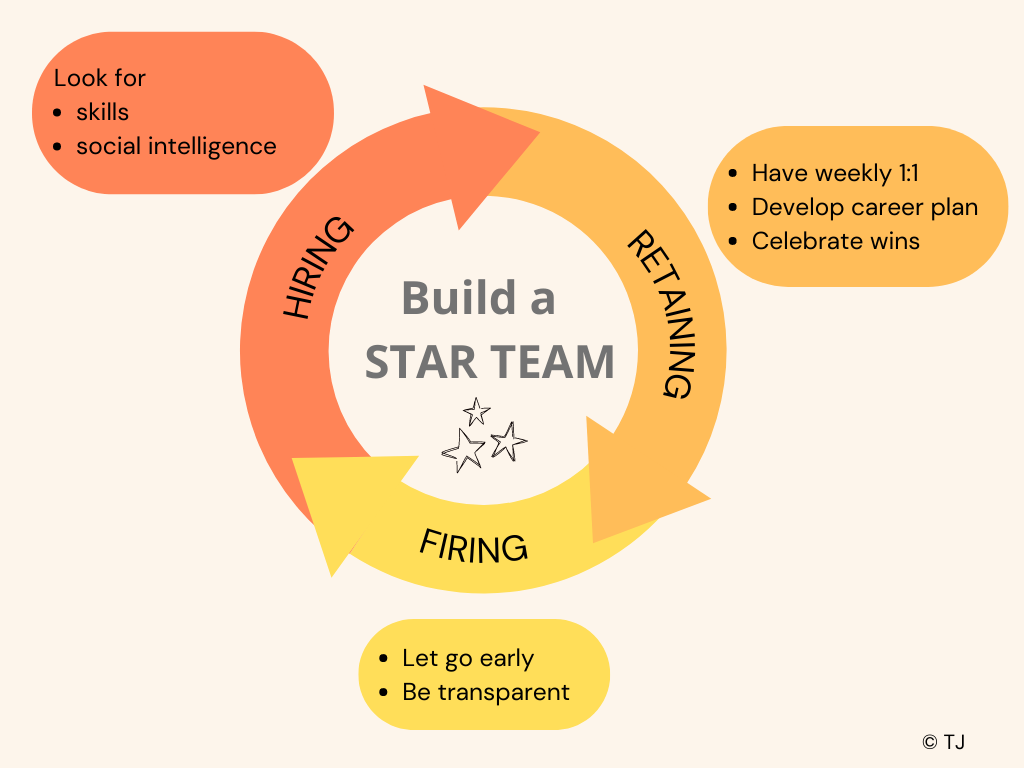How to build a great team, as a manager?
Hire deliberately, retain consciously and fire swiftly
Tell me in a sentence
Build a great team by hiring deliberately, retaining consciously and firing swiftly
Tell me in an image
Tell me more
Great things happen in your company when there are great teams delivering products and services that delight the customers. The saying goes that ‘People don’t leave companies, they leave managers’. The more accurate version is very likely ‘People don’t leave companies, they leave managers because of the teams they built’. Apparently, humans are the only species that can work in teams. So, what does it take to build a great team?
Hiring
Hiring is the most important step in building a great team. As a hiring manager, you need to have a clear idea regarding the skills that you are looking for. This will help you communicate your team’s needs to the recruiting team and write a good job description.
You can evaluate skills through a structured job interview that includes a knowledge test. Regarding the required skills, plan for your team’s needs for the next 1 year. Also, lookout for the candidates’s skill in picking up new skills. Being skilful in picking up new skills is a strong indicator of the candidate’s ability to . And note that years of experience is not always the best predictor of proficiency.
Social intelligence1 is another key item to evaluate. It refers to an individual's ability to empathize with others and their level of self-awareness. Research shows that team members with high Social Intelligence can make the team stronger2. The typical interview questions on ‘top strength and weakness’ or ‘tough manager’ or ‘conflict with your teammate’ are all about unearthing the candidate’s SI.
I also enjoy asking a couple of standard interview questions like ‘why do you want to work for us?’. I primarily use it to evaluate the candidate’s preparedness which is a good indicator of, well their preparedness for any given task.
Retention
It is not a surprise to learn that teams that stay together longer demonstrate higher performance3. But I continue to be surprised at the statistic that the average tenure of software engineers at top tech companies is about 2 years. Retention is boring because if you do it well, nothing happens - no unhealthy attrition, no unnecessary hiring and no hiring to fire. Maybe not nothing, there is slow and steady growth - both for the company and team. In a way, like compound interest, the returns are slow but so worth it.
One of my key takeaway from the book, "Nine lies about work"4 was about the importance of weekly 1:1s. There are so many different ways to run it, but I think having that weekly connect is your best tool to ensure that each team member has what they need to succeed - both in the short term(next week) and long term(career in the company). You can be your team’s ally in their exploration of their Ikigai role.
Google did a study on the effectiveness of a team, and they found that 5 characteristics of a successful team.
Psychological safety: Are team members comfortable sharing their ideas, say in a brainstorming session?
Encourage your team to know each other. This can be through working on projects together or through periodic coffee chats.
Train to separate ego from work. The goal should be to get the best work done possible, not to protect your work from feedback.
Dependability: Do team members trust each other to deliver high quality work on time?
Encourage your team to take control of their time to focus on important tasks as opposed to urgent ones.
Use meetings as option 3. Option 1 is an email, 2 is a document. Asynchronous communication FTW.
Applaud in public, feedback in private.
Support autonomy but ensure alignment
Structure & clarity: Does each team member know their goals and how it aligns with the team’s and the organizations?
Communicate the why and the what for each project.
Develop and communicate career plan for each team member5
Meaning of work: Does the team care about their work?
This part of the job could be outside your control as a manager. But you can always communicate why you care.
Impact of work :
Celebrate wins and achievements - both within the team and across the wider organization.
Encourage your team to show their work - both within the team and across the wider organization.
1 through 3 and 5are your responsibility as a manager to foster. 4 is one to evaluate during the hiring stage.
Firing
Firing is not a pleasant experience for people on both sides of the table. Fortunately, I have never sat on either end of that table. But having seen a few of those go around, my takeaway so far is that it is better done early and with as much transparency as possible.
If you delay letting go off an employee who is a bad fit, it will affect the whole team morale and productivity. Hence the urgency.
Two things can happen when there is an organization wide layoff. Either the company come out stronger on the other side or a lot of strong team members leave, leaving the company significantly worse off. Transparency in the layoff logic and way forward can be the difference between the two.
Good luck with your team building.
Edit on 8th Nov, 2022 - Atlassian provides this exercise to evaluate your team’s health
I found this SI test interesting. Guess I can brag about scoring 33 out of 36. How much did you score?
Page 6 in this Organization Science paper
When I write a book, that is the kind of name I want to give it. Don’t you want to read “Nine lies about work”?
Here is an example career framework from Dropbox





Love it. It’s so easy to lose sight of engagement and morale in day to day chaos, this is so critical!